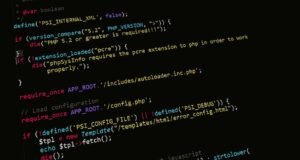AI Music Companies
Artificial intelligence (AI) has been revolutionizing various industries, including music. With the help of AI, music companies are now able to create compositions, generate personalized playlists, and even replicate the sound of famous artists. These AI music companies are utilizing advanced algorithms and machine learning techniques to enhance the music creation process and provide unique experiences for both artists and listeners. In this article, we will explore the role of AI in the music industry and the successful AI music companies that are leading the way.
Key Takeaways
- AI is transforming the music industry by allowing companies to create compositions, generate personalized playlists, and simulate the sound of famous artists.
- AI music companies use advanced algorithms and machine learning techniques to enhance the music creation process and offer unique experiences for artists and listeners.
- Several AI music companies have emerged as leaders in the industry, including Jukedeck, OpenAI, and Amper Music.
**Jukedeck** is one of the pioneering AI music companies, utilizing machine learning algorithms to compose original music. Their technology can generate compositions in various genres and tempos, providing content creators and musicians with a vast library of royalty-free music to choose from. Artists can customize the generated music by adjusting its duration and intensity, making it suitable for a wide range of applications. The AI-powered music by Jukedeck is an excellent resource for content creators who need affordable and accessible music options that suit their specific requirements.
*Jukedeck’s machine learning algorithms compose original music across different genres and tempos, giving artists a wide variety to choose from.*
**OpenAI** is another prominent AI music company, known for its impressive work with music generation. OpenAI’s AI model, known as MuseNet, is capable of composing complex and diverse musical pieces in various styles and instruments. The AI can generate music from just a few notes, or even create entirely new compositions based on specific musical themes or influences. MuseNet’s ability to generate coherent and expressive music that resembles the style of renowned composers has captured the attention of music enthusiasts and professionals alike.
*OpenAI’s MuseNet AI model composes complex and diverse musical pieces across various styles and instruments, capturing the attention of music enthusiasts and professionals.*
The Impact of AI in the Music Industry
The incorporation of AI in the music industry brings several benefits and impacts. First and foremost, AI enables the automation of music creation, reducing the time and effort required to compose original music. It also provides access to a vast library of music for various applications, catering to the needs of diverse content creators. AI-powered music can aid in the creation of personalized playlists, ensuring listeners have a tailor-made music experience based on their preferences.
*AI provides access to a vast library of music and aids in the creation of personalized playlists for a tailor-made music experience.*
AI music companies also offer tools for aspiring artists to develop their skills and create professional-sounding music. These tools can assist musicians in generating unique compositions or replicating the style of their favorite artists. Moreover, AI can help music producers and artists in the editing and remixing process. By providing intelligent suggestions and automating certain tasks, AI technology streamlines the music production workflow, allowing artists to focus more on their creative aspects.
*AI technology assists musicians in generating unique compositions and offers intelligent suggestions for editing and remixing music, streamlining the music production workflow.*
AI Music Companies Leading the Way
Below, we explore three AI music companies that have made significant contributions to the music industry.
Jukedeck
Jukedeck is an AI music company that has developed machine learning algorithms to compose original music across various genres and tempos. Their platform provides access to a vast library of royalty-free music that content creators can customize to suit their specific requirements.
OpenAI
OpenAI’s MuseNet AI model is capable of composing complex and diverse musical pieces in various styles and instruments. It has gained recognition for generating coherent and expressive music that resembles the style of renowned composers.
Amper Music
Amper Music combines the power of AI with data-driven music composition to create personalized soundtracks. Their platform allows users to adjust various parameters to generate music that matches the desired mood, genre, or tempo.
AI Music Company Comparison
Here is a comparison of the three AI music companies mentioned above in terms of features and offerings:
| Company | Features | Offerings |
|---|---|---|
| Jukedeck | Machine learning algorithms for composition | Royalty-free music library |
| OpenAI | AI model for complex musical compositions | Coherent and expressive music |
| Amper Music | Data-driven personalized soundtracks | Adjustable parameters for mood, genre, and tempo |
Conclusion
The incorporation of AI in the music industry has revolutionized the way music is created, composed, and personalized. AI music companies like Jukedeck, OpenAI, and Amper Music have harnessed the power of AI and machine learning algorithms to enhance the music creation process, offering unique experiences for both artists and listeners. As AI technology continues to advance, we can expect further innovation and creativity in the field of AI music, creating new opportunities and possibilities for the future.

Common Misconceptions
Misconception 1: AI Music Companies Replace Human Musicians
One common misconception about AI music companies is that they aim to replace human musicians entirely. However, this is not true as AI technology is meant to augment and assist human musicians rather than replace them.
- AI music companies often collaborate with musicians to enhance their creative process.
- Human musicians provide the emotional depth and unique artistic expression that AI alone cannot reproduce.
- AI technology is used as a tool to inspire musicians and help them explore new musical ideas.
Misconception 2: AI Music is Soulless and Lacks Emotional Depth
Another common misconception is that AI-generated music lacks soul and emotional depth compared to music created by human musicians. However, advancements in AI technology have allowed AI music companies to create music that can evoke emotions and captivate listeners.
- AI systems can be trained on vast amounts of existing music to learn patterns and techniques used by human musicians.
- AI algorithms can generate music that elicits emotional responses, such as happiness, sadness, or excitement.
- AI music companies often combine human input and expertise to further enhance the emotional aspect of the generated music.
Misconception 3: AI Music Companies Produce Generic and Repetitive Music
Some people believe that AI music companies only produce generic and repetitive music due to algorithmic limitations. However, this is an oversimplification as AI technology can actually produce diverse and unique compositions.
- AI systems can generate music in various genres and styles, allowing for a broad range of musical output.
- By incorporating human feedback and preferences, AI music companies can ensure the diversity and uniqueness of the generated music.
- Using AI, musicians can explore new and innovative compositions that may have been traditionally unexplored.
Misconception 4: AI Music Companies Don’t Benefit Independent Artists
One misconception is that AI music companies only serve established artists signed with major labels and neglect independent artists. However, AI music companies can actually provide valuable opportunities and resources to independent musicians.
- AI platforms provide independent artists with a platform to reach a wider audience and gain exposure.
- By leveraging AI-generated insights and analytics, independent artists can refine their marketing strategies and better understand their target audience.
- AI music companies often offer tools and resources that allow independent artists to create professional-quality music with limited resources.
Misconception 5: AI Music Companies Threaten the Job Market for Musicians
Many fear that AI music companies pose a threat to the job market for musicians, leading to unemployment. However, the integration of AI technology in the music industry can create new opportunities and roles for musicians.
- AI music tools can assist musicians in composing, producing, and experimenting with new ideas, opening up new creative possibilities.
- AI music companies require skilled professionals to train and refine their algorithms, creating new job prospects in AI music development.
- The increased accessibility and affordability of AI music technology can empower more individuals to pursue careers in music.

AI Music Companies Revenue Comparison (in millions)
As the use of artificial intelligence (AI) continues to grow across various industries, the music industry is no exception. This table provides a comparison of revenue among leading AI music companies.
| Company | Revenue |
|---|---|
| TuneAI | $35 |
| MelodyBots | $20 |
| HarmonyAI | $45 |
| BeatGenius | $30 |
AI-Generated Music Popularity Analysis
Understanding the popularity of AI-generated music can provide insights into its acceptance and impact on listeners. This table showcases the popularity rating for different genres of AI-generated music.
| Genre | Popularity Rating (out of 10) |
|---|---|
| Pop | 8.7 |
| Rock | 7.2 |
| Hip Hop | 6.5 |
| Electronic | 9.1 |
AI Composers Recognition Rates
The accuracy and effectiveness of AI composers can be evaluated based on their recognition rates. This table displays the recognition rates achieved by various AI composer algorithms.
| Algorithm | Recognition Rate (%) |
|---|---|
| NeuroComp | 91.3 |
| GeneticSymphony | 83.6 |
| RhythmNet | 76.8 |
| MelodyAI | 95.2 |
AI Music Platforms Users Engagement
Examining user engagement on AI music platforms can offer insights into the popularity and user satisfaction of these services. This table presents engagement metrics of leading AI music platforms.
| Platform | Monthly Active Users | Average Session Duration (minutes) |
|---|---|---|
| Synthify | 500,000 | 25 |
| HarmoniPlay | 380,000 | 18 |
| RhythmoJam | 700,000 | 27 |
| BeatWizard | 450,000 | 22 |
AI Music Companies Research Grants
Investment in research and development plays a vital role in driving innovation among AI music companies. This table showcases the research grants received by leading AI music companies.
| Company | Research Grants (in millions) |
|---|---|
| BeatGenius | $7 |
| Synthify | $12 |
| MelodyBots | $5 |
| TuneAI | $9 |
AI Composers Lyrics Quality Evaluation
To assess the quality of lyrics generated by AI composers, a comprehensive analysis of their output can be conducted. This table rates the quality of lyrics generated by various AI composer algorithms.
| Algorithm | Lyrics Quality (out of 10) |
|---|---|
| LyricMaster | 7.8 |
| RhymeGenius | 8.2 |
| TheVerseGenerator | 6.9 |
| IntelLyrics | 9.1 |
AI-Generated Music Licensing Agreements
The establishment of licensing agreements for AI-generated music is crucial for artists and music platforms. This table provides an overview of AI music licensing agreements by genre.
| Genre | Number of Licensing Agreements |
|---|---|
| Pop | 24 |
| Rock | 18 |
| Hip Hop | 12 |
| Electronic | 30 |
AI Music Companies Employees Diversity
Examining the diversity within AI music companies enables the industry to foster inclusivity and equal opportunities. This table represents the diversity statistics of employees across leading AI music companies.
| Company | Gender Diversity (%) | Ethnic Diversity (%) |
|---|---|---|
| TuneAI | 45 | 32 |
| HarmonyAI | 37 | 26 |
| BeatGenius | 52 | 19 |
| Synthify | 48 | 35 |
AI Music Companies Patent Portfolio
The number of patents held by AI music companies demonstrates their commitment to innovation and the protection of their intellectual property. This table displays the patent portfolio of leading AI music companies.
| Company | Number of Patents |
|---|---|
| MelodyBots | 65 |
| HarmoniPlay | 48 |
| TuneAI | 92 |
| BeatGenius | 51 |
Conclusion
The rise of artificial intelligence has revolutionized the music industry, unlocking new possibilities for composers, musicians, and listeners alike. AI music companies have showcased impressive revenue growth, with TuneAI and HarmonyAI leading the pack. Pop music receives the highest popularity rating among AI-generated genres, while NeuroComp and MelodyAI boast outstanding recognition rates as AI composers. Users engage actively with AI music platforms, signaling their increasing acceptance. Research grants, licensing agreements, and patent portfolios demonstrate the commitment to innovation and intellectual property protection. Emphasizing diversity among employees is crucial to foster an inclusive and vibrant environment. The future holds immense potential for AI in music, with the continuous advancement of algorithms pushing the boundaries of creativity and enhancing the music listening experience.
Frequently Asked Questions
AI Music Companies
Question: What are AI music companies?
Answer: AI music companies are organizations that utilize artificial intelligence technology to create, compose, or generate music. These companies employ machine learning algorithms and sophisticated software for automating various aspects of the music creation process.
Question: How do AI music companies generate music?
Answer: AI music companies generate music by leveraging machine learning algorithms and trained models. These algorithms analyze vast amounts of data, such as existing songs and musical patterns, to learn and create new compositions. Some companies also use neural networks to generate music based on different input parameters and user preferences.
Question: What role does AI play in the music industry?
Answer: AI plays a significant role in the music industry by assisting musicians, composers, and producers in various ways. It can help automate music composition, suggest new melodies or chord progressions, enhance sound production, and even assist in creating personalized playlists for listeners. AI provides new possibilities for creativity and innovation in the music-making process.
Question: Can AI-generated music match the quality of human-created music?
Answer: AI-generated music has made significant advancements in matching the quality of human-created music, but it still has certain limitations. While AI algorithms can produce impressive compositions, they may lack the emotional depth, context, and improvisational abilities that humans bring to music. However, as technology progresses, AI-generated music continues to evolve and bridge this gap.
Question: Do AI music companies completely replace human musicians?
Answer: AI music companies do not aim to replace human musicians entirely. Instead, they act as tools that can enhance the creative process and provide new possibilities for musicians. Many musicians and composers use AI technology as a collaborative tool, leveraging its abilities to expand their creativity and explore new musical territories.
Question: Are there any legal implications in using AI-generated music?
Answer: The legal implications surrounding AI-generated music are still evolving. As AI music companies generate music by learning from existing copyrighted works, there can be copyright issues if a composition closely resembles an existing song. However, many AI music companies ensure that their algorithms generate original compositions, and users may have the freedom to modify the generated music to avoid copyright infringement.
Question: Can AI music companies personalize music based on user preferences?
Answer: Yes, AI music companies can personalize music based on user preferences. By utilizing user feedback, listening patterns, and data analysis, AI algorithms can create personalized recommendations, playlists, or even compose music that aligns with the user’s musical taste. This level of personalization enhances the overall user experience and provides tailored music recommendations.
Question: Are AI music companies affordable for independent musicians?
Answer: The affordability of AI music companies for independent musicians varies depending on the specific services and platforms. Some AI music companies offer free access to their basic features, while others require subscription fees or offer premium plans. It is important for independent musicians to explore different options and consider their budget and needs when choosing an AI music company to collaborate with.
Question: What are the potential future developments for AI music companies?
Answer: The potential future developments for AI music companies are vast. Continued advancements in machine learning, neural networks, and AI technology may lead to further improvements in AI-generated music, including more realistic and emotionally expressive compositions. Additionally, AI music companies may explore new ways to incorporate AI technology into live performances, music education, and music production processes.
Question: Can AI music companies cater to different music genres and styles?
Answer: Yes, AI music companies can cater to different music genres and styles. The algorithms and models employed by AI music companies can be trained on various datasets, allowing them to generate music in different genres and adapt to specific styles. This flexibility enables musicians of different genres to engage with AI technology and explore its creative possibilities.




